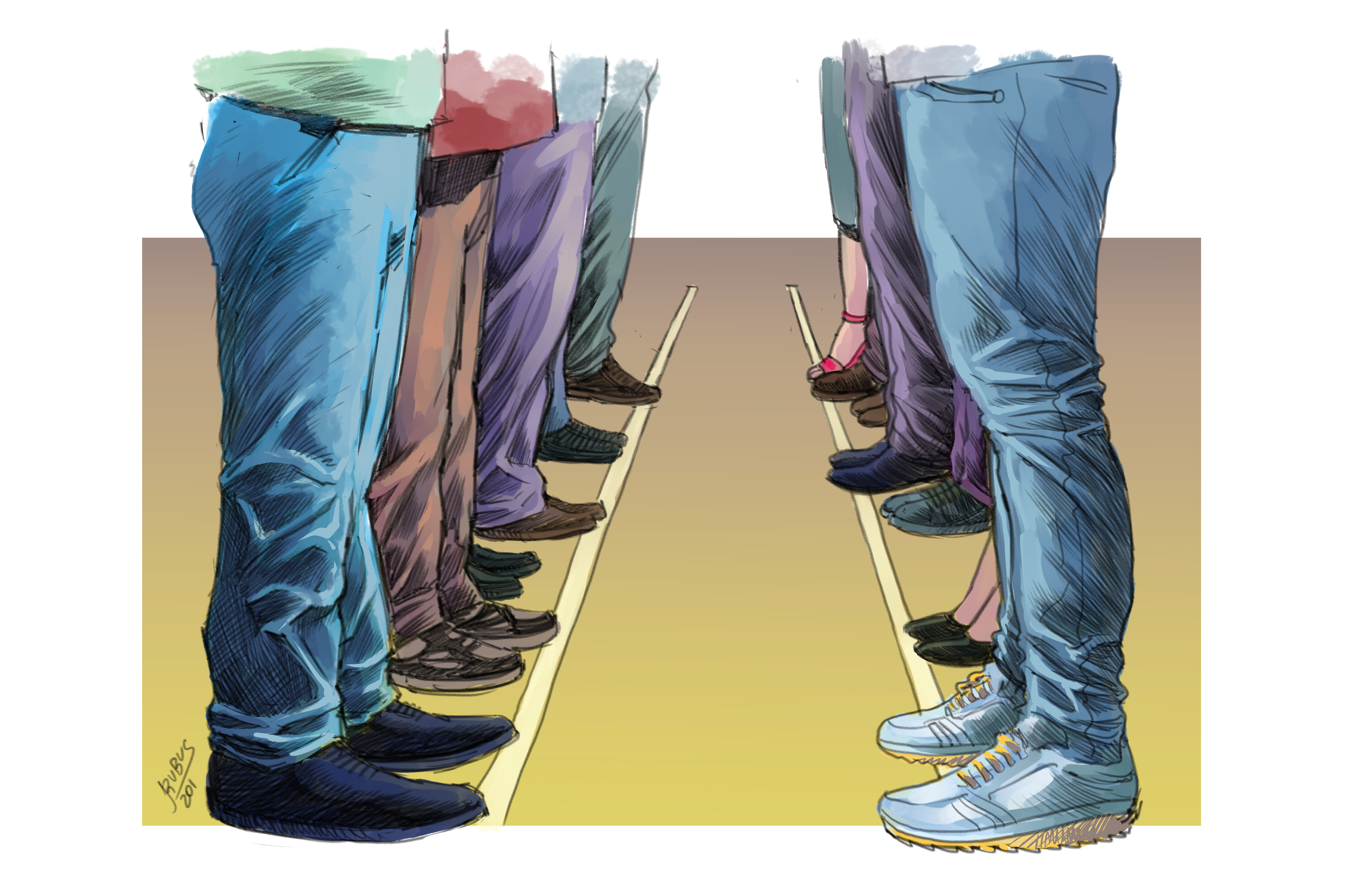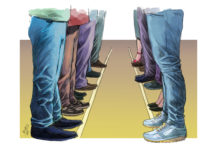On Saturday, June 1, 2019, Defy Ventures held an event called Business Coaching Day at the NationBuilder offices in downtown Los Angeles. As a nonprofit focused on reducing recidivism by supporting currently and formerly incarcerated men to become entrepreneurs, Defy puts on Business Coaching Days to give their participants, known as “Entrepreneurs-in-Training” or EITs, an opportunity to learn from and be mentored by local executives.
But their June event was unique: It was the first Business Coaching Day held outside prison, and therefore primarily aimed to help EITs in transitional housing. There were roughly 10 EITs and about as many mentors, so that all coaching rounds were staged as one-on-one meetings. In between the coaching rounds were more personal exercises and icebreakers. Three Crime Story writers — Shawn Boursiquot, Leland Hall, and Wesley Yiin — attended this event. These are Wesley’s reflections.
Two long strips of masking tape run parallel to each other — about two feet apart — along the length of the tiled floor. I step up to my line and find myself face-to-face with an intimidating man in an ill-fitting, bright orange dress shirt who has stepped up to his line. I peek down at his name tag: Boshko Ikovic. I later find out that Boshko grew up in Pasadena, that he was convicted seven times on drug-related charges, that he’s been out of prison for three months, and that he has dreams of opening up a skate and snowboarding shop. But at that moment, all I know is his name.
This exercise is taking place part way through Defy Ventures’s Business Coaching Day, which three Crime Story writers, myself included, are attending as volunteers. We started the day with introductions and icebreakers, and we’ve completed a round of one-on-one coaching on what to include in a resume. But now, it’s time to get deep.
Andrew Glazier, president of Defy Ventures, strolls past us, reciting the exercise’s directions. Entrepreneurs-in-training, or EITs, like Boshko stand on one side with their toes on their line, facing the event’s volunteers, including me, with our toes on our line. In Andrew’s hand is a list of statements that he’ll read one-by-one. Each participant must evaluate if the statement is personally true to us. If it is, we will stay put with our toes on the tape line. If it isn’t, we’ll take a step back. The point, Andrew explains, is to be open with one another, and to see how much we all have in common.
Andrew has one last mandate: eye contact with the person across from you. As our gazes zig-zag up from the floor and away from fixed spots on the blank wall, Andrew tells us that eye contact means vulnerability. Honesty. A willingness to confront our emotions.
Boshko and I stare into each other’s eyes. I smirk a little; he reciprocates. Through my peripheral vision, I realize he’s exactly what I would’ve pictured someone named Boshko Ikovic to look like. Coming in just under six feet, Boshko has graying hair, a sturdy build, and a small mole on his left cheek. When he opens his mouth, I see that his bottom row of teeth is somewhat scraggly. My age estimate changes drastically based on the angle at which I’m observing him. He could be anywhere from late 30s to late 50s. His gaze is focused and piercing.
The exercise begins with easy questions. “I like hip hop,” Andrew reads. Nearly everyone stays on their line. Glances and chuckles are exchanged. “I like Taylor Swift,” Andrew reads, pacing along the group. More than a few people step back, though many of the EITs — again, all men, mostly black or Latino — stay on the line. It’s the first shocker of the afternoon. Quickly, the questions get darker. “I heard gunshots in my childhood neighborhood.” “Violence took place in my home.” “I never knew at least one of my parents.” As with Taylor Swift, these statements send most, though not all, volunteers back, while keeping many EITs on the line.
“Eyes off the ground,” Andrew says as he walks past Boshko, rubbing his shoulder. As our gazes reconnect, I realize that Boshko eyes are glistening as he rapidly blinks. Soon enough, tears fall from them. Andrew reads a statement: “I could use a hug right now.” Boshko steps to the line first, and other EITs follow. The exercise breaks momentarily for a hug fest with Boshko as its epicenter. The EITs around him give him hugs and pats on the back as I stand back, waiting for them to finish. Perhaps sensing my hesitation, Boshko whispers, “Come on, Wesley,” as he pulls me in for a tight embrace.
Boshko might’ve been the first to cry, but he certainly wasn’t the last. The statements get devastatingly specific. “I’ve spent more than two years behind bars,” Andrew reads, as most of the EITs stay on the line. “Four.” Some step back. “Six. Eight. 10. 12.” He counts up. At 20, Boshko and maybe one other EIT are still on the line. Then, “I have spent more than a year in solitary confinement.” Most EITs are on the line. “Two years.” Some step back. Andrew counts up, and once again, Boshko is one of the last ones on the line. At this point, eye contact is fully impossible. Boshko looks up, trying to hold in his tears. I look down, deeply disturbed by the horrors these men have lived through.
At the end of the exercise, Andrew leads us through a debriefing, prompting us with questions like “What did you learn about yourself?” and “What surprised you?” In response to the latter question, I tell Boshko that I truly wasn’t expecting to hear that he or anyone in the room had spent such a long time in solitary. I tell him I’m sorry he went through that. “Don’t be sorry,” Boshko cuts in. “You have nothing to feel sorry about.”
We ignore some of the subsequent prompts and talk about forgiveness, which was the subject of some of Andrew statements. Boshko toed the line for “I haven’t fully forgiven myself,” while I stood back; I stepped up for “I haven’t fully forgiven someone in my life,” while Boshko stepped back. It turns out both of our responses relate to our distant fathers. “Talk to him,” Boshko cautioned. “Whatever you’re feeling and thinking, he’s probably feeling it too.” Boshko thanks God that he was able to reconcile with his father on his deathbed, but he wishes he’d done it sooner. That’s why he’s trying hard to communicate with his own son. “He has every right to hate me. He watched his dad go to jail.”
After a break and some pizza, we resume the mentorship part of the day with several rounds of coaching on personal statements and business concepts. It should feel strange to go from crying your eyes out to pitching a business idea, but these EITs seamlessly transition into professional mode. If anything, the line exercise has upped their self-confidence, while also boosting their comfort with us.
And finally, the session ends with a group reflection. Boshko gets up in front of everyone and says he’s grateful for their vulnerability and for letting him be vulnerable. He lets out a guttural groan as he says to himself, “Don’t do it right now — I’m about to tear up!” His eyes are glued to the ceiling. “Had I done this [Business Coaching Day] right after I got out, I’d be puking all over the floor,” he says. Everyone chuckles, but I wonder what he means. Is it that he’d feel disgusted by the prospect of outwardly displaying vulnerability and emotion? Or is it the opposite — that he hadn’t yet processed his feelings, so he’d be unable to contain and convey them?
Is there really a difference? Boshko wraps up by talking about being inspired by the coaches’ successes and feeling excited about his own prospects. “I’m happy with who I am right now!” he exclaims, as everyone applauds and cheers.


